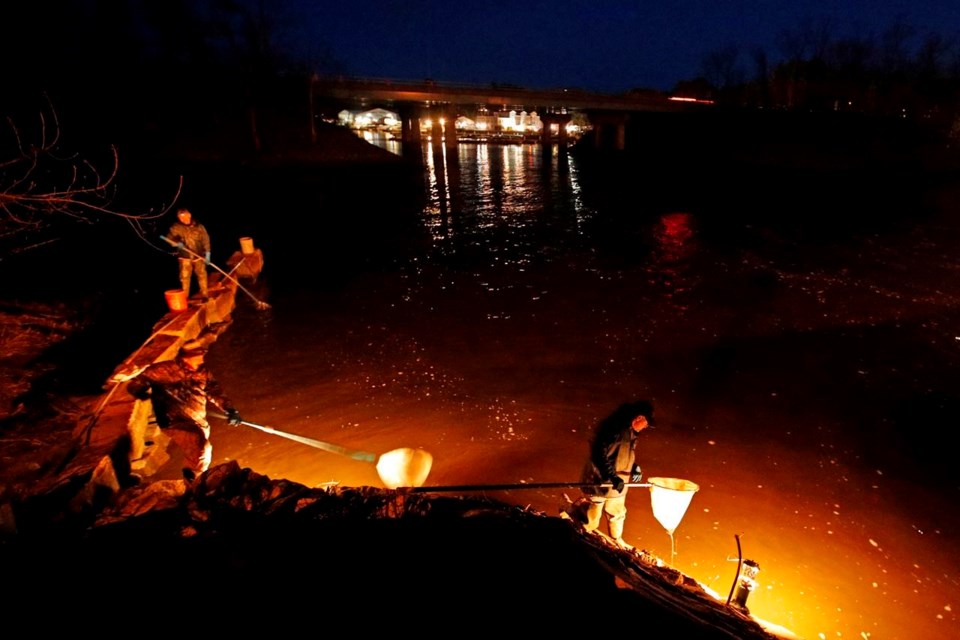HALIFAX — Hours into a barefoot trek in the middle of the night along a highway in rural Nova Scotia, stranded without a phone, Mi’kmaq fisher Kevin Hartling says he and his friend felt that if they stopped walking they might die.
Hartling, who is from Membertou First Nation, and Blaise Sylliboy, from Eskasoni First Nation, say that last week they were detained by federal fisheries officers for fishing near Shelburne, N.S. The two men from Cape Breton say that at around 1 a.m., they were left at a gas station far from home without footwear or cellphones and ended up walking for about six hours before they used a borrowed phone to get through to a friend, who picked them up.
"It's basically a starlight tour, " Hartling said in an interview Wednesday, referring to a practice where police in Canada have taken vulnerable Indigenous people to a secluded location and left them to find their way home, sometimes in freezing conditions. "That's what was going through my mind the whole time .... If we stop moving, we're going to die. If we go and just sit somewhere to rest and fall asleep, we're dead."
Hartling, 29, and Sylliboy, 25, were apprehended in the late evening on March 26 as they fished for baby eels, known as elvers. They say three fisheries officers put them into a vehicle and confiscated their phones and hip waders before leaving them at a gas station about a 45-minute drive from where they had been fishing.
The pair said when they were dropped off, they asked the DFO officers if they could have supervised access to their cellphones to write down contact information, or cut the feet off the waders so they wouldn't have to walk barefoot, and Hartling said they were turned down.
"They said: 'No. That's not our problem,'" Hartling said. Sylliboy gave a similar account in a Facebook post and during remarks at a protest Tuesday.
Ottawa closed the lucrative elver fishery on March 11 after violence and intimidation plagued the fishery last year in Nova Scotia and New Brunswick. But many Mi’kmaq people maintain they have a treaty right to fish for the tiny, translucent eels.
A spokesperson for the federal Fisheries Department confirmed in an emailed statement Tuesday that fisheries officers arrested and released two people on March 26 for infractions related to elver fishing in Shelburne County. The statement said it is common to seize gear such as hip waders and nets. The department did not immediately respond to a request for comment Wednesday.
On Tuesday, Prime Minister Justin Trudeau called the allegations of mistreatment "very troubling" and promised a complete investigation by his government.
Hartling said at the gas station they borrowed a phone and called numbers they could remember without access to contacts stored in their confiscated phones, but no one answered. The gas station clerk asked them to leave, so between around 1 a.m. and 6 a.m. the pair walked along the highway toward Liverpool, N.S., in hopes of finding a warm place they could spend the night.
"The blisters on my feet are still pretty bad, but they were a lot worse," he said.
About two hours into walking, after the socks they were wearing had "pretty much deteriorated" from walking on the wet pavement, Hartling said they found a clothing donation bin on the road, which "felt like a sign from God to us."
"We were just so happy we could find something else to put on our feet." After hours of walking in the cold, a car picked them up and took them to a convenience store, where they were able to reach a friend.
Priscilla Settee, a professor emerita of Indigenous Studies at the University of Saskatchewan, said in an interview Wednesday she was “disgusted” to hear of Hartling and Sylliboy’s story. She said it brought up painful memories of the far-reaching impacts of starlight tours on Indigenous communities in the Prairies.
“Starlight tours were intended to kill people. When you drop someone off in 30 or 40 below, with no shoes and no adequate winter clothing, then you can only read into it that it was meant to seriously injure or kill someone,” said Settee, who is Swampy Cree from Cumberland House First Nation in Saskatchewan.
"So I can’t believe this (type of incident) is happening in this era."
Darrell Night, an Indigenous man who in 2000 survived after being abandoned outside of Saskatoon by police officers in freezing conditions without winter clothing, is credited with calling national attention to the practice of starlight tours. Night died last year at the age of 56. After he spoke out, frozen bodies of two other Indigenous men were found in a similar area.
This report by The Canadian Press was first published April 3, 2024.
Lyndsay Armstrong, The Canadian Press



